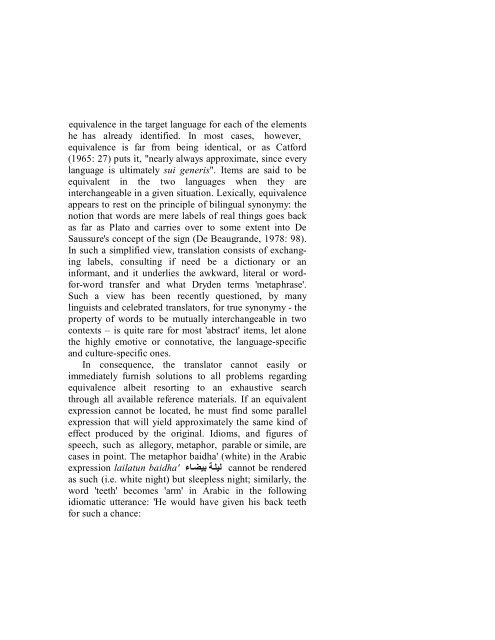424_2061_A.B.
424_2061_A.B.
424_2061_A.B.
- No tags were found...
You also want an ePaper? Increase the reach of your titles
YUMPU automatically turns print PDFs into web optimized ePapers that Google loves.
equivalence in the target language for each of the elementshe has already identified. In most cases, however,equivalence is far from being identical, or as Catford(1965: 27) puts it, "nearly always approximate, since everylanguage is ultimately sui generis". Items are said to beequivalent in the two languages when they areinterchangeable in a given situation. Lexically, equivalenceappears to rest on the principle of bilingual synonymy: thenotion that words are mere labels of real things goes backas far as Plato and carries over to some extent into DeSaussure's concept of the sign (De Beaugrande, 1978: 98).In such a simplified view, translation consists of exchanginglabels, consulting if need be a dictionary or aninformant, and it underlies the awkward, literal or wordfor-wordtransfer and what Dryden terms 'metaphrase'.Such a view has been recently questioned, by manylinguists and celebrated translators, for true synonymy - theproperty of words to be mutually interchangeable in twocontexts – is quite rare for most 'abstract' items, let alonethe highly emotive or connotative, the language-specificand culture-specific ones.In consequence, the translator cannot easily orimmediately furnish solutions to all problems regardingequivalence albeit resorting to an exhaustive searchthrough all available reference materials. If an equivalentexpression cannot be located, he must find some parallelexpression that will yield approximately the same kind ofeffect produced by the original. Idioms, and figures ofspeech, such as allegory, metaphor, parable or simile, arecases in point. The metaphor baidha' (white) in the Arabicexpression lailatun baidha' cannot be renderedas such (i.e. white night) but sleepless night; similarly, theword 'teeth' becomes 'arm' in Arabic in the followingidiomatic utterance: 'He would have given his back teethfor such a chance:51
















